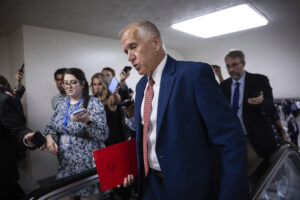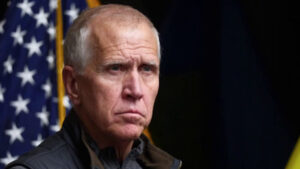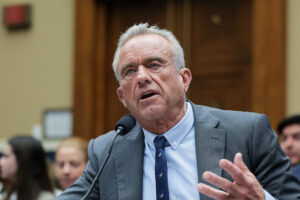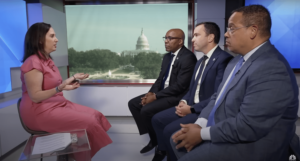The Dictatorship
Here’s how Trump and Musk’s can hurt each other — and us

An explosive breakdown in the relationship between President Donald Trump and his biggest political donor turned part-time employee, Tesla CEO Elon Musk, has been foreshadowed since their alliance first took shape. When Trump brought Musk along for the ride as he moved back into the White House, the looming question was always how long the two could possibly stay in sync. After all, neither the most powerful person in the world nor the richest person on Earth is known for keeping his ego in check.
The main thrust of the Trump-Musk feud boils down to who can assert dominance over the other. In the intense back-and-forth that had everyone glued to their screens Thursday, we saw bullies used to getting their way desperately trying to find leverage over each other. But unlike the flame wars of old, where internet trolls would hurl insults at each other across message board forums, Trump and Musk can do serious damage to each other in the real world — and to the rest of us in the process.
The main thrust of the Trump-Musk feud boils down to who can assert dominance over the other
Musk first gained access to Trump through his vast fortune; he donated almost $300 million during last year’s election and hasn’t been afraid to throw his money around in races this year. Though he said in May he would be “spending a lot less” on funding political races, he has also been quick to threaten pumping money into the midterms should lawmakers back the massive budget bill currently working its way through the Senate. And Musk has made clear that he expects a return on his investments, having already snidely claimed on his X platform that Trump would have lost and Democrats would have taken Congress without his backing.
Trump is reportedly more focused on the midterms than he was during his first term, worried that a new Democratic majority would lead to more investigations and/or a third impeachment. While he’s already sitting on $600 million to help hold on to a GOP majority, Musk’s money could throw a spanner in the works, especially if he follows through on his public musing about bankrolling a third party to “represent the 80% of Americans in the middle.” Though Trump has his own social media platform, Truth Social, X remains a much louder microphone to amplify Musk’s messaging to the right, including his supposed “bombshell” about Trump’s presence in the Jeffrey Epstein files. (Musk provided no evidence for the claim and Trump has previously denied any involvement with Epstein’s criminal behavior.)
Trump, in turn, has threatened Musk’s lucrative government contractswhich would include billions of dollars funneled toward his SpaceX companyas well as the subsidies that Tesla receives for its electric car production. Musk responded by warning about cutting off access to SpaceX launcheswhich would potentially cripple NASA and the Defense Department’s ability to deploy satellites. But that would prove a double-edged sword for Musk, given how large a revenue stream those contracts have become.
By Thursday evening, Musk had already backed down from his saber-rattling about restricting access to the Dragon space capsule, but he could change his mind again. That he made the threat in the first place has raised major alarm bells among national security officials. The Washington Post reported Saturday that NASA and the Pentagon have begun “urging [Musk’s competitors] to more quickly develop alternative rockets and spacecraft” to lessen his chokehold on the industry.
Notably, Trump isn’t alone in his fight against Musk, though as ever those wading into the brawl have their own motives. Former White House strategist Steve Bannon took the opportunity to launch a broadside against Musk. “People including myself are recommending to the president that he pull every contract associated with Elon Musk,” Bannon told NBC News on Thursday night. Bannon requested that “major investigations start immediately” into, among other things, Musk’s “immigration status, his security clearance and his history of drug abuse.” There are already several federal investigations of Musk’s companies that have been underway for years, which critics had previously worried might be stonewalled due to his influence with Trump.
Even if the two eventually reach a détente, it’s unlikely to be a lasting peace, not so long as one feels his authority is challenged by the other.
While the extremely public breakup makes for high drama and more than a little schadenfreude, the pettiness masks a deeper issue. The battle Musk and Trump are waging is predicated on both wielding a horrifying amount of unchecked power. In a healthy system of government, their ability to inflict pain on each other wouldn’t exist, or at least such an ability would be severely blunted. Musk being able to funnel nearly unlimited amounts of spending into dark money super PACs is an oligarchical nightmare. Trump using the power of the presidency to overturn contracts and launch investigations at a whim is blatant authoritarianism in action.
In theory, there are still checks to rein each of them in before things escalate much further. Musk’s shareholders have been unhappy with his rocky time in government, and the war of words with Trump sent Tesla’s stock price tumbling once more. Trump needs to get his “One Big Beautiful Bill Act” passed into law and — next year — ensure Congress doesn’t fall into Democrats’ hands. Trump and Musk have incentives, then, to stay in each other’s good graces despite their wounded pride.
Trump made clear to NBC News in an interview Saturday that he has no real interest in patching things up with Musk, warning that there will be “very serious consequences” if his one-time ally funds Democratic campaigns. Even if the two eventually reach a détente, it’s unlikely to be a lasting peace, not so long as one feels his authority is challenged by the other. The zero-sum view of the world that Trump and Musk share, one where social Darwinism and superior genetics shape humanitydoesn’t allow for long-term cooperative relationships. Instead, at best they will return to a purely transactional situationship, but one where the knives will gleefully come back out the second a new opening is given.
Most importantly, there is no protagonist when it comes to the inciting incident in this duel, as a total victory won’t benefit the American people writ large. Trump wants Congress to pass his bill to grant him more funding for deportations and to preserve his chances of staying in power. Musk wants a more painful bill that will slash the social safety net for millions. No matter what the outcome is as they battle for supremacy over each other, we’re the ones who risk being trampled.
Hayes Brown is a writer and editor for BLN Daily, where he helps frame the news of the day for readers. He was previously at BuzzFeed News and holds a degree in international relations from Michigan State University.
The Dictatorship
Republican North Carolina Sen. Thom Tillis announces he will not run for re-election
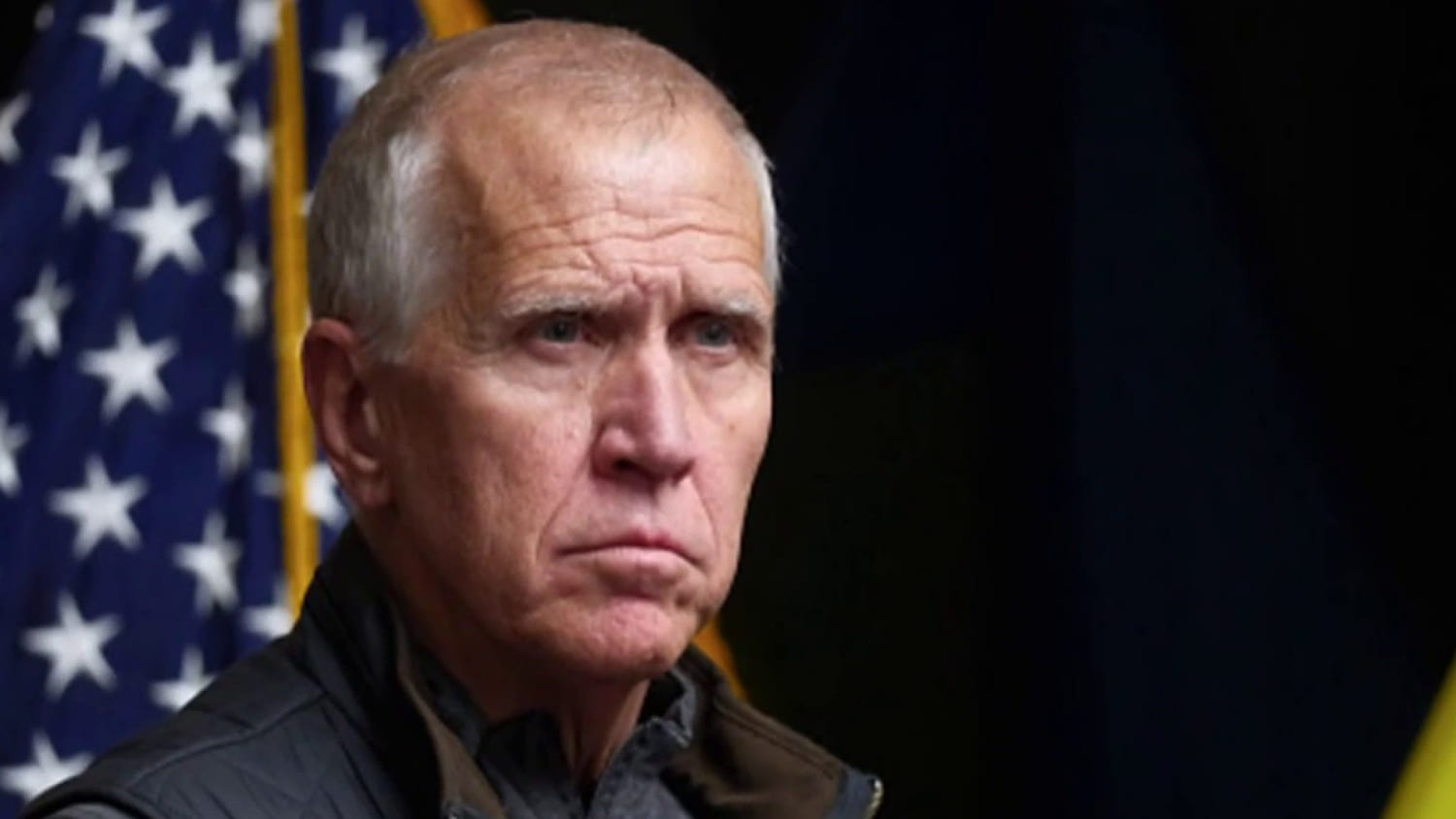
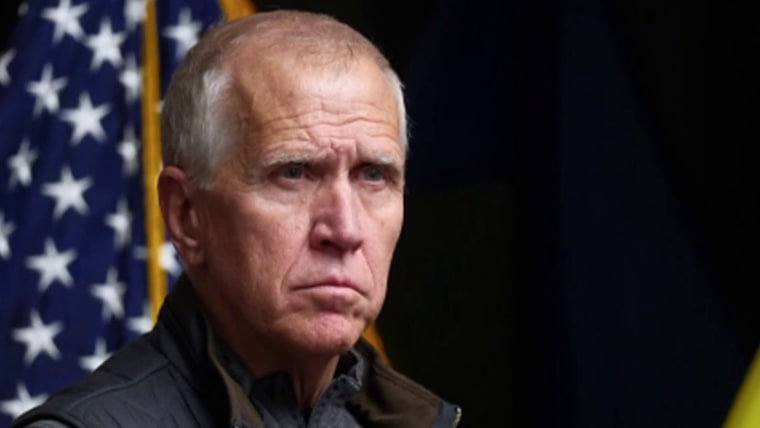
-

Analyst says it will take weeks, if not months, to know real damage to Iran’s nuclear program from U.S. airstrikes
05:12
-
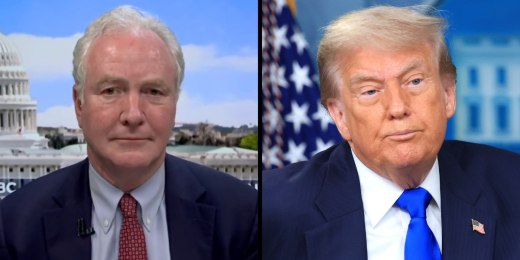
Senator Chris Van Hollen on Trump spending bill as it enters debate on Capitol Hill
08:23
-
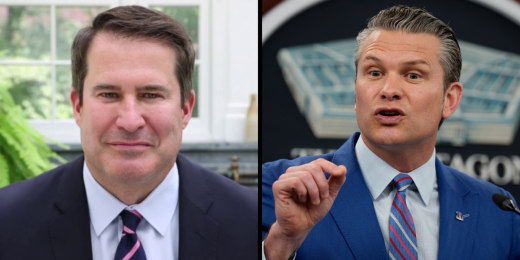
Inside the Iran airstrikes briefing: Rep. Moulton on the demeanor of Secys. Rubio, Hegseth
08:27
-
Now Playing

-
UP NEXT

‘This bill is a ripoff’: Sen. Amy Klobuchar on Trump Budget Bill
08:51
-

Family of Venezuelan man deported to El Salvador has no idea of his condition
02:53
-

Protests grow over as Florida’s ‘Alligator Alcatraz’ set to open
01:19
-

Middle East expert discusses impact of U.S. strikes on Iranian regime and Supreme Leader
06:56
-
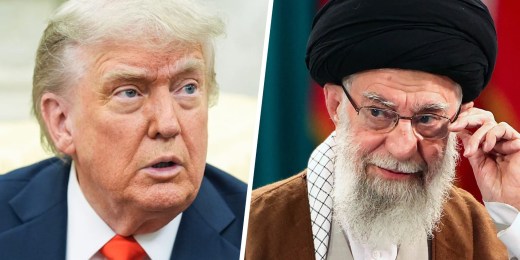
Fmr. U.S. Envoy to Iran reacts to U.S. strike on nuclear facilities and says Iran won’t negotiate soon
11:59
-

Anti-war protests form in New York City following U.S. strikes in Iran
02:27
-

Top House Armed Services Democrat: Trump violated the law with U.S. strikes on Iran
04:41
-
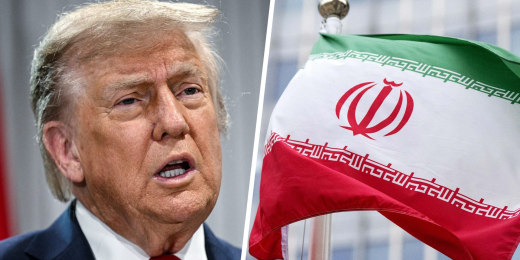
Fmr. U.S. Envoy to Iran says Trump should be more patient when seeking new Iran nuclear deal
09:16
-

Former Marine asks for sympathy for troops put in difficult position in L.A. over protests
05:05
-

Retired Lt. Gen. warns any U.S. operation against Iran’s nuclear program comes with heavy risks
08:57
-
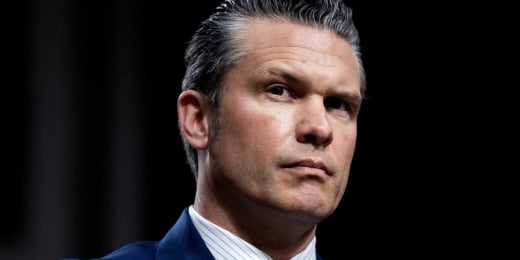
Rep. Auchincloss slams Defense Secretary Hegseth after fiery Capitol Hill national security hearing
05:46
-
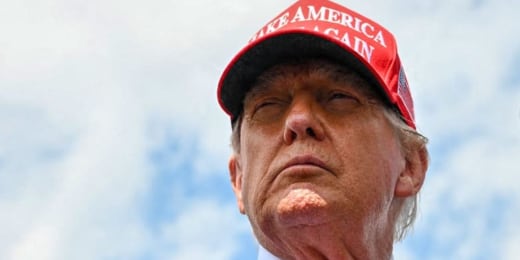
Former GOP advisor questions what advice Trump is listening to over Iran decision
07:44
-

Rep. Garcia questions new rules on congressional ICE facility visits and calls them ‘illegal’
07:05
-

Fmr. Rep. Riggleman torches Trump over handling of Israel-Iran conflict and his key decision
06:48
-

Israel says it killed top Iranian commander in strike
02:34
-

Mahmoud Khalil vows to keep speaking out against the war in Gaza: ‘The fight is far from over’
06:17
-

Analyst says it will take weeks, if not months, to know real damage to Iran’s nuclear program from U.S. airstrikes
05:12
-

Senator Chris Van Hollen on Trump spending bill as it enters debate on Capitol Hill
08:23
-

Inside the Iran airstrikes briefing: Rep. Moulton on the demeanor of Secys. Rubio, Hegseth
08:27
-
Now Playing

Republican North Carolina Sen. Thom Tillis announces he will not run for re-election
02:41
-
UP NEXT

‘This bill is a ripoff’: Sen. Amy Klobuchar on Trump Budget Bill
08:51
-

Family of Venezuelan man deported to El Salvador has no idea of his condition
02:53
The Dictatorship
RFK Jr. wants all Americans to use wearable health tech. I have questions.
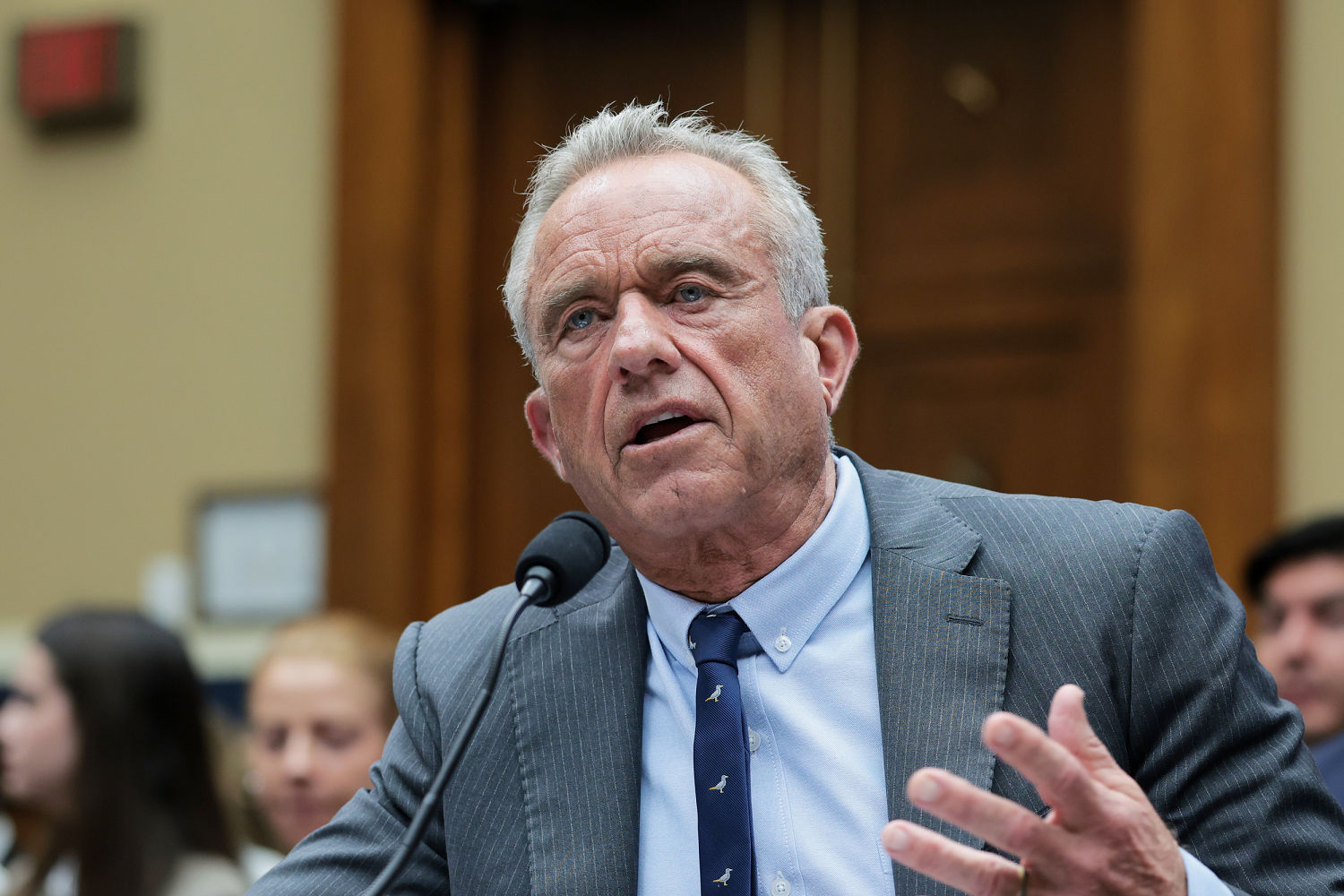
In a congressional hearing this past week, Health and Human Services Secretary Robert F. Kennedy Jr. shared his views on improving the health of Americans. “My vision is that every American is wearing a wearable within four years,” he said. And next week, his department is scheduled to launch one of “the biggest campaigns in HHS history,” focused on encouraging Americans to use wearable technology to “take control over their own health.”
Making wearable health technology accessible to more Americans is an excellent idea — the massive $63 billion market for fitness trackers and $12.6 billion glucose monitor sector are growing exponentially due in part to the fact that awareness of one’s biometrics, from steps taken to sleep quality to calories consumed, can help improve health. But we shouldn’t overstate the power of these devices to transform the well-being of Americans, both because of the limitations of these technologies and because of the administration promoting it.
Making wearable health technology accessible to more Americans is an excellent idea — but we shouldn’t overstate the power of these devices.
Wearable health aids have a long history. Leonardo da Vinci designed the first pedometer around 1500, and Holter heart monitors were invented in 1949. Digital technology, however, has accelerated innovation in this space exponentially, such that in the 15 years since the release of the first step-counting Fitbit in 2010, devices now track sleep, breath, stress levels and more.
A federal campaign to promote wearables appeals to the commonsense idea that the more you know, the better equipped you are to improve your health — and thus more Americans should have access to this knowledge. And this initiative certainly lines up philosophically with the individualistic sensibility at the heart of the “Make America Health Again” movement’s animating definition of wellness, which elevates self-knowledge — “do your own research” — above clinical expertise, especially if it involves pharmaceutical intervention. Indeed, in the hearing, Kennedy described friends who “lost their diabetes” after wearing glucose monitors, thanks to their “miraculous” awareness of the impact of their dietary choices (evidence does show that diet and exercise changes can reverse Type 2 diabetesand that continuous glucose monitoring can be effective in motivating patients to make those shifts). Notably, the proposed HHS wearables campaign would come with a price tag of $80 a month for individuals, as opposed to GLP-3s, which can cost a person over $1,000 monthly.
You don’t need to be a MAHA acolyte to find this strategy compelling for a nation struggling with both chronic illness and the cost of health care. Furthermore, large-scale advertising campaigns encouraging personal fitness are a long-standing and effective federal strategy. It was Kennedy’s uncle President John F. Kennedy who most famously employed this approach, launching a national publicity campaign to encourage Americans to be more physically active, both in their personal lives and by lobbying local officials to fund physical education and community recreation programs.
That was during the Cold War, and JFK often linked the need to get moving with military preparedness. But he also talked about taking responsibility for looking good and feeling “vigorous,” for men, women and children alike. “Soft Americans” were morally suspect and national security risks, the then-president-elect wrote in a 1960 Sports Illustrated essay, but they also looked less attractive at the beach or the pool, the environments in which he was often photographed.
Physical education classes were as important as academic offerings, his administration emphasized in pamphlets, posters and even a special-release jingle written for P.E. classes that encouraged boys and girls through a playful, synchronized routine to “get rid of that chicken fat.” These federal campaigns didn’t solve the issues of sedentariness and obesity, but they were integral in establishing the expectation that it is the responsibility of every American to care about their physical fitness.
Echoes of the elder Kennedy’s approach are unmistakable in Robert F. Kennedy Jr.’s announced advertising campaign. The differences, however, should give us pause. For one, the sophisticated wearable technology the health secretary celebrates as “miraculous” is much more powerful than the toe touches and jumping jacks promoted in JFK’s day. This is a boon, but we should be wary of the “techno-utopianism” that assumes more sophisticated technology always yields a better future.
We should not overstate the “miraculous” potential of any intervention, especially given this administration’s repeated ethical breaches on questions of security and science.
Psychologists, for example, track a recent rise in orthorexia, body dysmorphia and anxiety, disorders that only stand to be aggravated by access to endless streams of biometric data. More philosophically, sociologists warn of the dangerous tendency toward “the quantified self” and attendant “intimate forms of surveillance,” in which we normalize defining ourselves as an agglomeration of figures and metrics, existing only to be optimized.
Most immediately, as Kennedy was asked in the hearing but did not clearly answer, are concerns about data collection and privacy, especially relevant due to recent breaches like the 23andMe hackwhich leaked the data of millions of users to the public and potential nefarious actors. Fitness tracker data has already created a specific liability. The Strava running app, for example, has repeatedly revealed sensitive locations of troops and political figures to the public.
These are thorny but perhaps resolvable problems. It is true that making America healthy is an urgent priority and that individuals should be empowered to be stewards of their own well-being. We must use every tool at our disposal to achieve better health outcomes, and this can include partnering with the dynamic fitness and technology industries, the innovation of which outpaces that of the public sector.
That said, we should not overstate the “miraculous” potential of any intervention, and especially given this administration’s repeated ethical breaches on questions of security and science — and even its alleged affinity for eugenics — we should be especially vigilant about how this initiative is plays out.
Natalia Mehlman Petrzela is Professor of History at The New School in New York City. She is the author of two books, most recently “Fit Nation: The Gains and Pains of America’s Exercise Obsession,”and is currently a Carnegie Fellow, working on a new book about education and political polarization.
The Dictatorship
Pete Hegseth’s press conference shows how the Trump administration views the media’s job
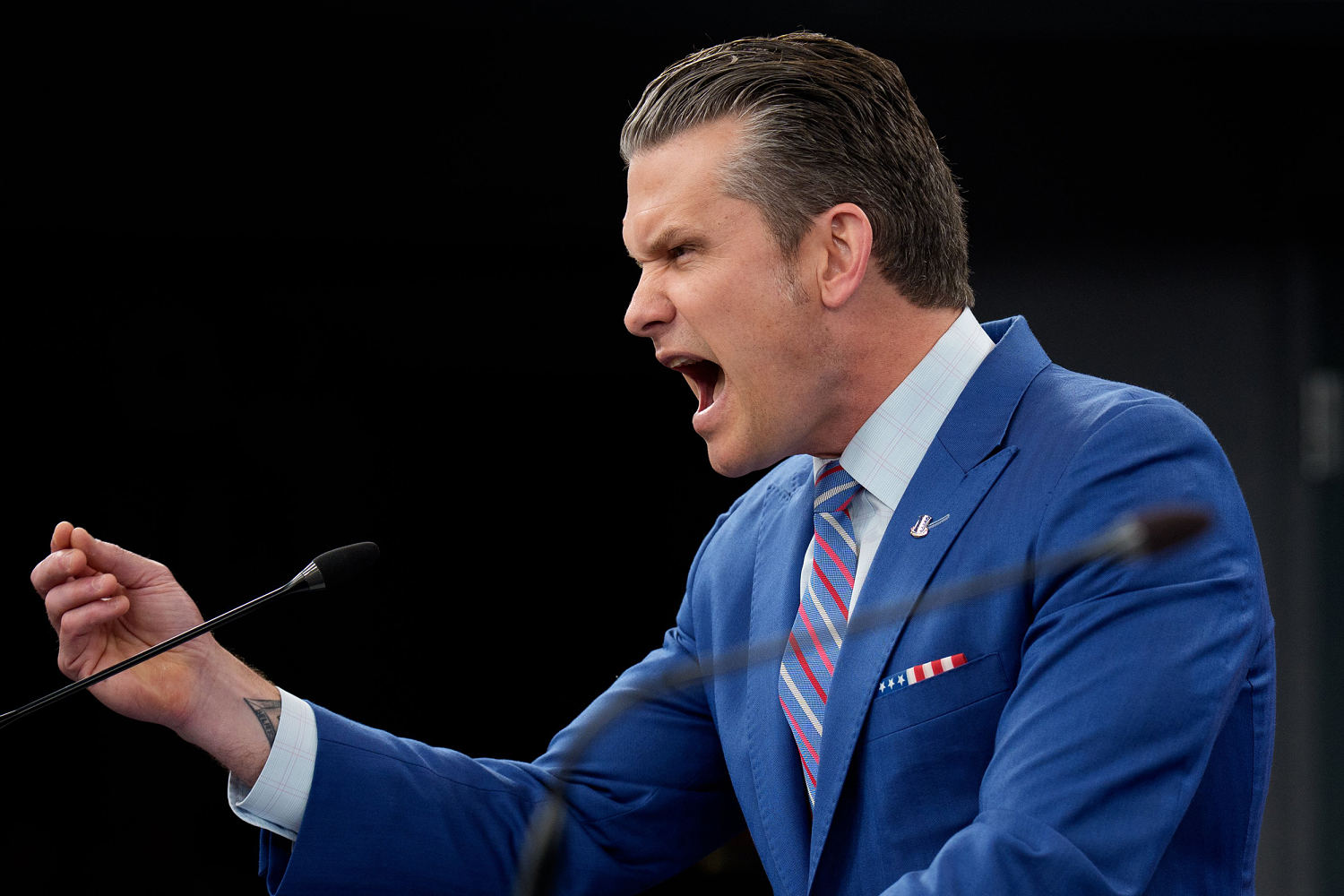
Defense Secretary Pete Hegseth was in full crybully mode during a Thursday news conference that, according to a Truth Social post from President Donald Trump, was intended “to fight for the Dignity of our Great American Pilots” and provide “interesting and irrefutable” evidence of the “LEGENDARY” success of last week’s unilateral U.S. attack on Iran’s nuclear facilities.
But Hegseth didn’t provide definitive evidence of the actual extent of the damage inflicted on those facilities by 30,000-pound bunker-busting bombs — or clarity on whether Iran pre-emptively moved its stash of weapons-grade uranium. Instead, the secretary complained that certain media outlets failed to act as unquestioning cheerleaders of a stunning act of aggression against a longtime U.S. adversary — an attack that the president had immediately declared an unequivocal success.
The 42-minute press conference was a useful distillation of the Trump administration’s posture vis-à-vis news coverage: playing the pure-as-driven-snow victim while lashing out in fashion.
It is quite literally the job of reporters to ask the government for evidence to back up its claims.
Hegseth insisted the attack was successful in “decimating — choose your word — obliterating, destroying Iran’s nuclear capabilities.” He blasted the press for reporting on a leaked preliminary intelligence assessment by the Pentagon’s Defense Intelligence Agency, which asserted that the U.S. attack may have only set back Iran’s nuclear program by months.
The secretary repeated the fact that the DIA’s initial assessment was of “low confidence” and insisted the reporting should have instead been about the awesomeness of the weapons and the bravery of the pilots who conducted the mission. I’m sure the weapons were awesome and the pilots were brave — and details of those tools of war and the risks of the mission were, in fact, reported widely in the mainstream press. But no matter which party is in power, it is quite literally the job of reporters to ask the government for evidence to back up its claims. And few details are more crucial to verify than those pertaining to military conflict.
That’s not how Hegseth, a former co-host of “Fox & Friends,” sees the media’s role in covering the Trump administration.
“How about we celebrate … how about we talk about how special America is that only we have these capabilities? I think it’s too much to ask, unfortunately, for the fake news,” Hegseth added. “We’re urging caution about pre-premising entire stories on biased leaks to biased publications trying to make something look bad. How about we take a beat, recognize first the success of our warriors, hold them up, tell their stories, celebrate that, wave an American flag, be proud of what we accomplished.”
But that’s the thing. We don’t know “what we accomplished.” That’s what journalists are asking the government, represented by Hegseth, to prove by sharing actionable evidence.
Hegseth even lashed out at his former colleague, longtime Fox News national security correspondent Jennifer Griffin, for having the temerity to ask the defense secretary about satellite imagery that showed at least a dozen trucks at one of Iran’s nuclear facilities days before the attack.
“Jennifer, you’ve been about the worst. The one who misrepresents the most intentionally,” the former daytime talk show host scolded the longtime hard-news reporter. Griffin retorted, “In fact, I was the first to describe the B-2 bombers, the refueling, the entire mission with great accuracy … so I take issue with that.”
Trump, long known to hire people based on their Fox News appearances, gave Hegseth high marks for his performance.
The president — a notorious anti-free speech ideologue — was on a press-hating tear of his own this week. He called for the firing of BLN reporter Natasha Bertrand, posting to Truth Social, “I watched her for three days doing Fake News. She should be IMMEDIATELY reprimanded, and then thrown out ‘like a dog.’” And the president also had his lawyer threaten to sue The New York Times and BLN for reporting on the DIA’s initial post-attack intelligence report. According to the Times, Trump’s lawyer wrote that the paper’s reporting “had damaged Mr. Trump’s reputation” and demanded a retraction and apology for “false,” “defamatory” and “unpatriotic” reporting.
It doesn’t get much more “crybully” than the most powerful person in the world siccing his lawyer on news outlets whose reporting on a government document hurt his feelings.
But there’s a lesson here for institutions, including universities, white shoe law firms and media corporations that continue to face Trump’s shakedown threats: Don’t give the schoolyard bully your lunch money in the hopes that he won’t demand it again.
Don’t give the schoolyard bully your lunch money in the hopes that he won’t demand it again.
The Times’ deputy general counsel, David E. McGraw, responded to Trump’s legal threat with a letter of his own, writing that it would be “irresponsible for a president to use the threat of litigation to silence a publication” for reporting on the government’s own intelligence that suggested “the President may have gotten it wrong in his initial remarks to the country.”
“No retraction is needed. No apology will be forthcoming. We told the truth to the best of our ability. We will continue to do so,” the letter concluded.
That’s how you do it. Simply ignore being insulted as “unpatriotic” for asking questions to which the public deserves to know the answers. Don’t report on war as if it were a child’s game of heroes and villains and super-cool fireworks and explosions. Make the government prove its own claims. And do not agree to settlements when it comes to Trump’s bogus, anti-free speech lawsuit lawfare. Refuse to be bullied and all the bullies can do is cry more.
Anthony L. Fisher is a senior editor and writer for BLN Daily. He was previously the senior opinion editor for The Daily Beast and a politics columnist for Business Insider.
-

 The Josh Fourrier Show8 months ago
The Josh Fourrier Show8 months agoDOOMSDAY: Trump won, now what?
-
Uncategorized8 months ago
Bob Good to step down as Freedom Caucus chair this week
-

 Politics8 months ago
Politics8 months agoWhat 7 political experts will be watching at Tuesday’s debate
-

 Politics8 months ago
Politics8 months agoHow Republicans could foil Harris’ Supreme Court plans if she’s elected
-
Economy8 months ago
Fed moves to protect weakening job market with bold rate cut
-
Economy8 months ago
It’s still the economy: What TV ads tell us about each campaign’s closing message
-

 Politics8 months ago
Politics8 months agoRFK Jr.’s bid to take himself off swing state ballots may scramble mail-in voting
-
Uncategorized8 months ago
Johnson plans to bring House GOP short-term spending measure to House floor Wednesday




